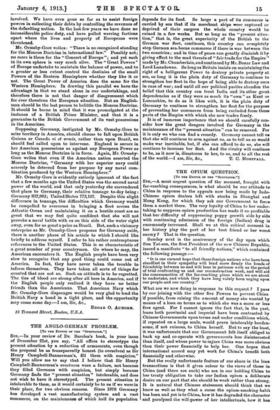THE ANGLO-GERMAN PROBLEM.
[To Tar EDITOR OF Tar "SPIZCTATOR:1 Sin,—In your review of Dr. Sarolea's book, in your issue of December 21st, you say, "All offers to stereotype the present situation by a reduction of armaments, even though the proposal be as transparently honest (to ourselves) as Sir Henry Campbell-Bannerman's, fill them with suspicion." Will you allow me to say that I believe that Sir Henry Campbell-Bannerman's overtures were a failure, not because they filled Germans with suspicion, but simply because Germany finds the "present situation" intolerable, and does not wish to have it stereotyped. The present situation is intolerable to them, as it would certainly be to us if we were in their place, for two obvious reasons. Since 1870 Germany has developed a vast manufacturing system and a vast commerce, on the maintenance of which half its population
depends for its food. So large a part of its commerce is carried by sea that if its merelant ships were captured or deprived of their cargoes the whole country would be ruined in a few weeks. But so long as the "present sites- tion," that is, the great superiority of the British to the German war fleet, continues, this country can completely stop German sea-borne commerce if there is war between the two countries ; and in time of peace can greatly diminish it by giving effect to the mad threats of "fair trade for the Empire" made by Mr. Chamberlain, and continued by Mr. Bonar Law and Lord Lansdowne. So long as Britain insists on maintaining the right of a belligerent Power to destroy private property at sea, so long it is the plain duty of Germany to continue to strengthen her fleet in the hope of being able to destroy ours in case of war ; and until all our political parties abandon the belief that this country can treat India and its other great dependencies as if they were as much its "own" as Kent or Lancashire, to do as it likes with, it is the plain duty of Germany to continue to strengthen her fleet for the purpose of preventing her commerce from being excluded from those parts of the Empire with which she now trades freely.
It is of immense importance that we should carefully con- sider how the great dangers involved for Germany in the maintenance of the "present situation" can be removed. For it is only we who can find a remedy. Germany cannot tell us that she will continue to arm against us, as to tell us so would make war inevitable, but, if she can afford to do Bo, she will continue to increase her fleet. And the rivalry will continue to be, as it now is, disastrous to her, to us, and to all the rest






















































 Previous page
Previous page